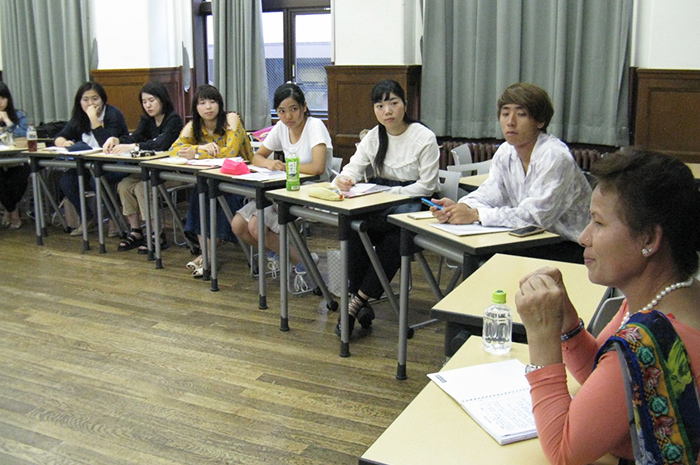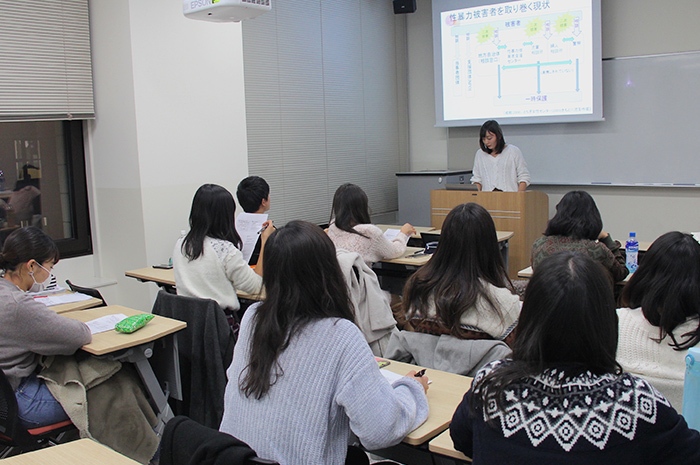Class Introduction:Seminar (International Cooperation 1・2)
What kind of subjects do FGS students usually take and what do they learn?
This time, we introduce the subject “Seminar (International Cooperation 1・2)” by Masako Tanaka.

Comment from Professor:
In response to the question “What is the difference between a seminar and other lectures?” I answer that from the students’ perspective, the difference is this: a lecture is a time to learn from the teacher’s talks, which is Input, whereas a seminar is a time to transform one’s learning into forms of presentation or theses, which is Output, and deepen understanding with classmates. For this purpose, we value time to leave the classroom and go to places like cinemas or archives to confirm differences in ways of thinking and feeling.
In 2016, with the theme “Multicultural Coexistence seen from local governments, immigrants from abroad, and local residents of Japan - The role of NPOs and the use of
social resources” in mind, we visited Ooizumi Town in Gunma Prefecture. In 2017, under the theme “Questioning our agency living in the mainland - Militarism, violence, and exclusion examined in Okinawa”, we conducted fieldwork in Okinawa.
Students who come to the seminar are interested in international cooperation as a means to eliminate poverty and discrimination, but at first, they tend to view this as something practiced in a distant world, avoiding thinking of it as relevant to themselves. I myself have been involved in practical work in education, health, disaster prevention, and peacebuilding in South Asia and West Africa. After returning to Japan, I began to be involved as a citizen in consulting and assisting residents with foreign roots, doing volunteer visiting work for homeless people, and participating in movements to eliminate gender discrimination. Only then did I begin to understand deep-seated structural issues. I want students to understand that international cooperation can be practiced in everyday life and that they must change themselves to change the world.
Through the seminar, the goal for the third year is to develop media literacy to critically read information, legal literacy to be sensitive to rights, and to recognize discrimination and disparities arising from differences in gender, gender identity, sexual orientation, age, disabilities, ethnicity, nationality, mother language, marital status, family structure, and employment status. Furthermore, I aim to foster students who grow into citizens capable of exercising practical consideration for gender and diversity, and who courageously take action to change society.

Class Interview
I was interested in fair trade, which can be said to be “international cooperation close to home”, and I chose this seminar because I was attracted by the opportunity to deepen my understanding of citizen movements and their actors. One feature of this seminar is the ample opportunity for practical learning. In June 2017, we invited Charimaya Tamang, a Nepalese victim of human trafficking, to our class. She is one of the founding members of Shakti Samuha, a survivors’ organization, working to support women and girls who fell victim to trafficking. It was only after she raised the issue of the commodification of sex, such as JK business and forced appearances in AV in Japan, that we realized that “there are so many problems lurking around us.” Her actions prompted us to deeply consider what we could do, such as “creating an environment where those who have been victimized feel more comfortable speaking out and presenting solutions.” Through topics covered in our seminars, we are able to more closely connect ourselves with society. (Makiko Yonehara, Third-year, Faculty of Global Studies)
My friends are sometimes surprised and say, “Although you're a foreign language department student, you're taking a seminar in the Department of FGS?” I enrolled in the English Department because I wanted to improve my language skills, but I could not give up my desire to engage in international cooperation so I chose the seminar in the FGS. This decision has allowed me to learn about international cooperation while
studying a foreign language. In the seminar, we give presentations on issues particularly related to gender within international cooperation, and exchange opinions with other students which deepens our awareness of what we want to research. Since the members share similar interests, we receive precise feedback on our presentations. I have started researching health and gender disparity, and I am feeling the importance of listening to the opinions of peers who have different perspectives from my own. The flow of the seminar has a completely different kind of feeling compared to regular lectures. (Yuna Tamura, Third-year, Department of English, Faculty of Foreign Languages)
